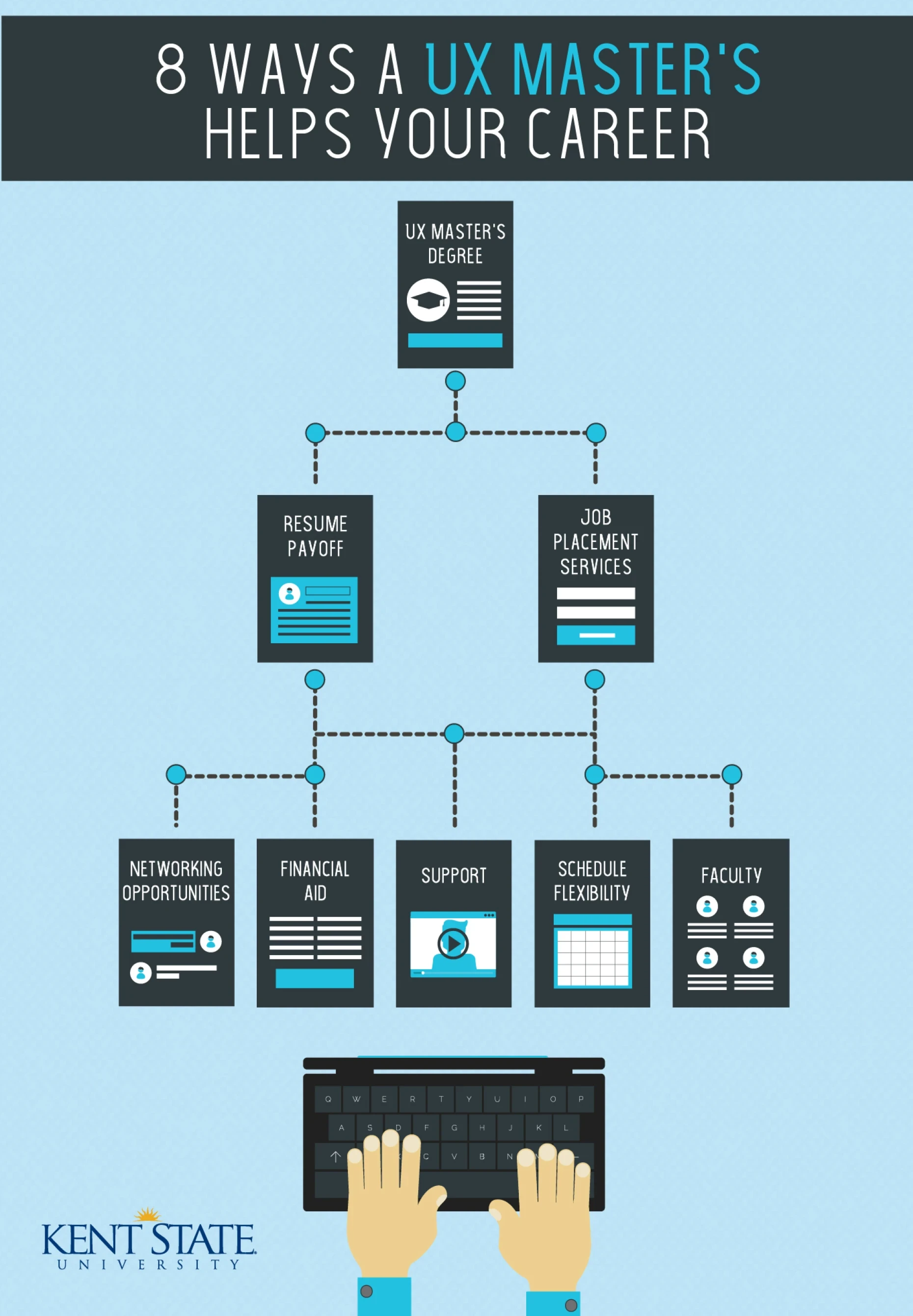Websites, eCommerce sites, email campaigns, eReaders, mobile apps and more—if you’ve used a screen or a keyboard lately, you’ve touched the work of someone with a job in user experience design (UXD).
These days, most companies rely on the know-how of people with UX skills, and a career in UX design is currently one of the fastest growing jobs in the United States, with the potential for continued salary growth and a great work-life balance as well.1
But, how do you gain that crucial UX expertise to land a great job in this new field?
One of the best ways to acquire the skills for a career change or promotion in UX design is to earn a master’s degree in UX design. In fact, an entirely online program can offer you the flexibility to complete your degree on your own schedule, wherever you live, in addition to allowing you to work online, in your comfort zone and realm of expertise.
Check out these reasons why earning an online master’s degree in UX design could help you move in the right direction.
Is an Online Master’s in User Experience Design Right for You?
1. Schedule Flexibility
An online Master’s in UX Design program usually takes around two years to complete, with two or three courses taken per semester.
Online classes are extremely flexible—they’re designed to be done by students with full-time jobs and other life commitments, which allows you to work at a time that’s best for you as you complete your degree.
2. Faculty
The faculty behind this type of degree are often pioneers in the field of user experience design, bringing with them active industry experience and a passion for human-centered design thinking. These instructors come from diverse backgrounds and are often involved in national UXD organizations.
Not only have the professors been vetted to meet the university’s educational standards, they have been tried and tested in the industry itself. Many have the ability to serve as industry contacts for students and alumni, and you’ll come to know them on a more personal level when you’re enrolled in a university’s degree program.
With the opportunity to be taught by the professionals who lead the way for UX design overall, who knows what you’ll be capable of achieving in your career?
3. Support
When you enroll in a master’s degree program at an accredited university, you’ll have support every step of the way. Earning your master’s may feel daunting, and sometimes you might not be sure what your next move should be. Support during this period of your education is vital, and a university will be there for you in a way that shorter-term learning experiences might not be.
Whether the admissions team connects you with department contacts or you’re talking on the phone with your personal student success coordinator, you won’t have to do it on your own. The staff behind your degree program wants you to succeed!
4. Networking Opportunities
Obtaining an advanced degree in UXD means you’ll spend two years working with career-minded, driven individuals, all focused on optimizing user-friendly designs. Each student could become a valuable member in your network of UXD contacts after the program ends.
UX design is a unique field—it’s applicable to all industries, meaning that someone in your online study group might design a million-dollar mobile app or build a website that teaches simple coding to kindergarteners. It’s worth getting to know the other students in your program, as the time you put into an advanced degree can also pay off in contacts.
Plus, to create further networking opportunities for students, you could always start your own MeetUp group or organize Skype hangout sessions, so you can mingle and network with classmates, while tackling project deadlines.
5. Complete Education
In a Master’s in UX Design program, you’ll learn to optimize websites and design apps, but you’ll also train your brain to think of the user first, rather than yourself. A shorter program may not provide the time to hone your complete skill set—you’ll still need to be adaptable to varying client requirements, market changes and additional feedback.
Two years spent immersed in the world of UXD will get you ready to land the job you want, may make real-time impact in your current career and teach you how to continue to find advance in the field overall.
6. Financial Aid
It’s no secret that earning your master’s degree can be a little costly. Fortunately, many programs offer financial aid in the forms of loans, scholarships, tuition reimbursement from jobs, veteran funding and other alternatives.
7. Job Placement Services
When you invest in a master’s degree, the university you attend (whether online or on campus) also invests in you. Many programs have excellent job listservs and may have partnerships with companies looking to directly hire new graduates.
Since you’ve taken the time to get an advanced degree, you could be a far more attractive candidate than someone who’s simply taken a few classes to learn basic skills. The faculty could also be a source of great network contacts and may even have opportunities to share with you.
8. Resume Payoff
There’s nothing sweeter than adding a few more letters to your name. When you earn a Master’s in User Experience Design, you’ll have an advanced degree on your resume, which can help you stand out from a crowd of applicants in a high-demand hiring pool.
Unlike applicants who may have attended a few classes or short-term training sessions, you’ve devoted the time required to learn the extensive skill set a UXer needs in the workforce—a master’s degree shows potential employers you’re serious about and committed to your chosen career path.
Are You Ready?
With a master’s degree in your discipline, not only do you demonstrate the proficiency to meet the role requirements, you’ve also demonstrated your ability to manage working full-time and earning an advanced degree. Who wouldn’t want someone with that type of work ethic on their team?
Interested in finding out more about an online Master’s in UX Design program? Check out how others have made the leap into a successful UX design career with an online master’s degree.
Sources:
- Retrieved on September 1, 2017, from onwardsearch.com/career-center/ux-careers-guide/






